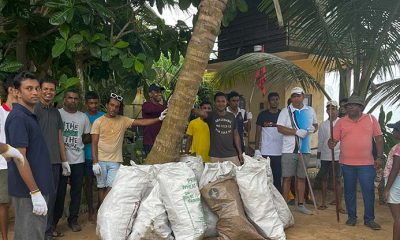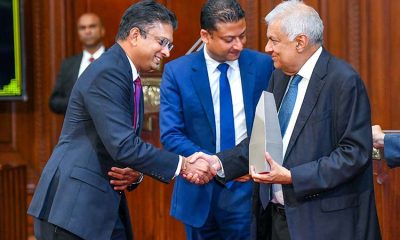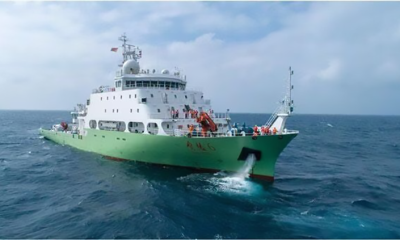Editorial
A question of legitimacy

Saturday 26th November, 2022
Dissident SLPP MP and former Minister Prof. Channa Jayasumana has said something noteworthy during the ongoing budget debate. He has argued that President Ranil Wickremesinghe, who succeeded President Gotabaya Rajapaksa, does not have a popular mandate to govern the country and therefore should not make crucial policy decisions on national security, etc. He has offered to present a private member’s motion to enable the President to hold a snap presidential election and seek a mandate from the people.
The government stands accused of trying every trick in the book to postpone the local government polls, and never will it take a bigger electoral gamble. But the argument that the current administration lacks legitimacy holds water in that it is doing exactly the opposite of what the SLPP undertook to do in its election manifestos presented to the public before the 2019 presidential election and the 2020 parliamentary polls.
The people voted the UNP out of power in 2020 because they did not approve of the way it handled national security and the economy, and elected the SLPP to make a difference. They handed over the reins of government to Gotabaya Rajapaksa and Mahinda Rajapaksa as they desired a clean break with the previous government.
Former President/Prime Minister Mahinda Rajapaksa, MP, taking part in the budget debate, on Wednesday (24), said: “When we took over in 2019 the Yahapalana government had drawn huge loans. We have done all we can to help the country. We had to face the Easter Sunday attacks and the COVID-19 pandemic. We are still trying to overcome their adverse impacts.”
Now, the uphill tasks of managing the economy and protecting national security have been entrusted to the UNP, which worsened the country’s debt crisis, according to Mahinda, and was rejected by the public twice. The country has undergone a reversion to the Yahapalana rule in all but name without public approval. The SLPP leaders have not only betrayed public trust but also made a mockery of the will of the people.
Moreover, one of the key pledges that enabled the SLPP to obtain a popular mandate to govern the country was that it would never privatise state assets. President Wickremesinghe admitted in Parliament, the other day, that former Prime Minister Rajapaksa was opposed to the divestiture of state ventures. The current administration has reneged on this pledge against the wishes of not only the people who voted for the SLPP but also the leader of that party himself!
As for national security, the Presidential Commission of Inquiry (PCoI), which probed the Easter Sunday terror attacks, held the entire Yahapalana government accountable. The final report of the PCoI says, “The government including President Sirisena and Prime Minister [Ranil Wickremesinghe] is accountable for the tragedy” (p. 471). National security is now under the purview of Wickremesinghe!
What has led to sea changes in the current administration’s policies was a wave of public protests, which came to be known as Aragalaya. The manner in which the President and the Prime Minister were ousted was far from constitutional. Even incumbent President Wickremesinghe, who benefited from Aragalaya, has refused to accept it as something legitimate. Hence his recent vow in Parliament to prevent a recurrence of Aragalaya and even deploy the military and declare a state of Emergency to abort it. He would not have threatened to do so if he had not been convinced that Aragalaya lacked legitimacy. Thus, a radical departure from the SLPP’s policies endorsed by the people in a constitutionally-prescribed manner at two elections in 2019 and 2020 requires approval by the public either at a general/presidential election or a referendum. Why the Opposition has baulked at flogging this issue is the question.
Editorial
Where are workers?

Wednesday 1st May, 2024
Another International Workers’ Day has dawned. Grand preparations have been made in this country to celebrate it amidst an unprecedented economic crisis. These celebrations, however, have little or nothing to do with workers; they have apparently everything to do with political parties and their leaders. The next presidential election is only a few months away, and therefore we will see a lot of political muscle flexing today, with the prospective candidates bringing as many supporters as possible to Colombo from all parts of the country to attract media attention.
Given the despicable manner in which Sri Lankan politicians use workers to gain political mileage on the pretext of championing the rights of the working class, one wonders whether Sri Lanka should have a separate workers’ day on 21 March, when the World Puppetry Day falls. We hold workers in high esteem and intend no affront to them, but it needs to be said that the spectacle we behold on 01 May, year in year out, is a grand puppet show. Worryingly, workers do not care to assert themselves at least on May Day, much less eclipse politicians. They are not ashamed of making a public display of their servility to their political masters.
All political parties that stand accused of having suppressed labour rights have trade union wings, which have workers on a string. The UNP ruthlessly crushed a general strike in 1980. It resorted to mass sackings, and about 50,000 strikers were terminated overnight for demanding a pay hike. Dozens of those unfortunate men and women took their own lives. It is also celebrating the International Labour Day, with its trade unionists carrying its leaders on the shoulders and singing hosannas. The SLPP, whose leaders have the blood of workers on their hands and bankrupted the economy, causing many job losses, and reducing millions of people to penury, is also celebrating the International Workers’ Day! The same goes for the SLFP, which left the 1980 strikers in the lurch after they lost their jobs, and became part of the incumbent dispensation. The JVP, which murdered many trade union leaders and workers for opposing its terror campaign in the late 1980s, now claims to be the greatest protector of workers’ rights. It unflinchingly betrayed workers in 1980 by pulling out of that year’s general strike at the eleventh hour; in doing so, it demoralised the protesting workers beyond measure and emboldened the J. R. Jayewardene government to crush the strike. It is also celebrating the International Workers’ Day today. Time was when the traditional left was at the forefront of struggles to win workers’ rights, but unfortunately it has been in the SLFP-led governments responsible for gross violations of labour rights.
It may not be fair to say workers have not gained anything, at all, under successive governments. There are some progressive labour laws and workers’ welfare schemes. But workers would not have been in the current predicament if those governments had worked with their interests at heart. Workers are struggling for survival because all governments since 1977 have aggravated the country’s debt burden, which led to the current crisis precipitated by the Gotabaya Rajapaksa government.
Trade unions in Sri Lanka have earned notoriety for overstepping their limits, and some of their leaders have strayed into active politics at the expense of their members’ interests. Several trade unions were among those who misled President Gotabaya Rajapaksa and contributed to the ruination of the economy. It was at their behest that he plunged head first into a disastrous experiment with organic farming.
It is time Sri Lankan workers, especially their trade union leaders, abandoned the practice of helping further the interests of politicians on May Day, and realised the need to liberate themselves from the clutches of political parties. Let that be their May Day resolution.
Editorial
JVP in NPP’s clothing

Tuesday 30th April, 2024
The JVP-led NPP has come under an avalanche of criticism for a claim made by Nalin Hewage, one of its stalwarts, in a recent television debate, that the victims of the JVP’s reign of terror in the late 1980s were anti-social elements such as rapists, robbers, bootleggers and cattle rustlers. A protest was held near the JVP headquarters, Battaramulla, yesterday, against that controversial claim.
Hewage’s assertion runs counter to JVP/NPP leader Anura Kumara Dissanayake’s recent statement, in Canada, to the effect that he was sorry for the JVP’s violence in the late 1980s. One wonders whether the JVP is remorseful for its terrorism (1987-89) or divided on that score, with the party’s ultra-radical core remaining unremorseful. Is the JVP in the NPP alliance trapped in what may be called the Dr. Jekyll and Mr. Hyde duality? Other political parties planning to contest the upcoming presidential election are out for the JVP’s blood, so to speak, the prominent among being the SJB, the UNP and the SLPP.
The UNP has condemned the JVP for the latter’s mindless violence in the late 1980s. It seems to think the people have forgotten its own Caravan of Death, which left thousands of youth dead. It ran many torture chambers, massacred suspects and buried them in mass graves or burnt them on tyre-pyres on the roadside by way of a warning to others. Most of all, the country would not have been plunged into a bloodbath if the UNP had not falsely accused the JVP of complicity in the 1983 anti-Tamil pogrom and proscribed it. Perhaps, the UNP destroyed more lives than the JVP did during the 1987-89 period. Worse, the UNP, had no qualms about enlisting the JVP’s support to retain its hold on Parliament after falling out with President Maithripala Sirisena in 2018. The ‘Marxist’ JVP unashamedly propped up the beleaguered ‘capitalist’ UNP administration! The SJB leaders were in the UNP government, which benefited from the JVP’s backing. They did not make an issue of the JVP’s ugly past then.
The SLPP is also without a moral right to condemn the JVP for its past violence. Its leader Mahinda Rajapaksa would not have won the 2005 presidential election but for the JVP’s support. It was the JVP which led his propaganda campaign to all intents and purposes and made his victory possible.
The JVP is playing the victim card to gain public sympathy. It says it has become a target of the political elites in the SLPP, the UNP, the SJB, the SLFP, etc., They, it says, have banded together, shedding their differences, to suppress it. This claim is not without a modicum of truth. The leaders of the political parties opposed to the JVP co-operate to safeguard their interests, and that is why none of their leaders have been incarcerated for their crimes despite regime changes. But one disagrees with the JVP on the Marxist markers used in identifying elites. Going along with Vilfredo Pareto’s theory of elites instead, one may argue that the JVP leaders cannot be excluded from the political elites. Examining the structure and change of elites, Pareto has convincingly argued that elites and non-elites are not stable and new elites rise and oust othe old ones, and this change is called the circulation of elites, which has not spared the JVP. Besides, the JVP has earned notoriety for political promiscuity. It has honeymooned with the parties it describes as elitist. In 1970, it backed the SLFP-led United Front, and turned against the newly-formed government the following year. In the late 1970s, it got close to the UNP, whose government released its leaders from prison. Later, it turned on the UNP and met its Waterloo in 1989. In 1994, it backed the SLFP led by Chandrika Bandaranaike Kumaratunga, and subsequently fell out with it. In 2004, it coalesced with the SLFP and had representation in the UPFA Cabinet. The following year it enabled Mahinda to realise his presidential dream. It took on Mahinda later on. In 2015, it honeymooned with the UNP again for about five years. Now, it is on a campaign to vilify the UNP and its leader Ranil Wickremesinghe.
Fear being expressed in some quarters that the JVP is likely to revert to its old ways and suppress political dissent ruthlessly the way it does in universities is not unfounded. Its role in the 2022 protests, especially the abortive march on Parliament, has fuelled the fear that it has not bid farewell to extra-parliamentary methods to capture state power.
The JVP would have the public believe that winning the next presidential election will be a walk in the park for it, but reality is otherwise. It has its work cut out to allay fears in the minds of the public. Having made a colossal blunder at the last presidential election, the people are not likely to vote blindly for any political party or person again. The least the JVP can do to gain public confidence is to tender an unqualified apology for its past crimes and publicly abandon its outdated ideology.
Editorial
Boosting state revenue

Monday 29th April, 2024
The Committee on Public Finance (COPF), headed by SJB MP Dr. Harsha de Silva, is reported to have called upon the government to re-evaluate its tax policies, systems and mechanisms to boost state revenue. It has reportedly explained revenue losses in terms of what has come to be known as the Laffer curve, according to which when tax rates are extremely high, they lead to a decrease in taxed activities such as investment and consumption, causing a drop in state revenue, and when tax rates are too low, they fail to yield sufficient revenue for the state.
The SLPP government, under President Gotabaya Rajapaksa, did away with some taxes and slashed others at the expense of state revenue, but it has, under President Ranil Wickremesinghe, moved to the other extreme. The need is for a via media.
Citing reasons for the drop in state revenue, the COPF has highlighted the Excise Department’s failure to bust the fake revenue sticker racket and collect duties on liquor efficiently. However, impervious to logical reasoning and wise counsel, the government continues to labour under the misconception that jacking up taxes is the only way to boost state revenue although unconscionable tax increases lead to tax avoidance or evasion and promote the growth of the so-called underground economy.
The government does not curtail its wasteful expenditure for state revenue to increase. It has embarked on a campaign to shower handouts on the poor ahead of the upcoming presidential election to compass its political ends despite calls for it to rationalise welfare expenditure and ensure that poor relief is properly targeted. State funds are also wasted on useless government ceremonies and politicians’ junkets. Corruption, which is rampant among government politicians and officials, also causes huge losses to the state coffers, as evident from the Health Ministry procurement scams.
The COPF has expressed serious concern about the inordinate delay in digitalising the excise duty collection process. If the Excise Department as well as other revenue-generating agencies such as the Customs could be rid of various malpractices, which deprive the state coffers of billions of rupees annually, perhaps it may be possible to pass the benefits of revenue increases therefrom on to the public. It is the corrupt who fear and resist digitalisation, which could be considered the most efficacious antidote to corruption, for it engenders transparency.
It is hoped that the government will heed the COPF guidelines for increasing state revenue by preventing losses and eliminating waste instead of burdening the public with more taxes.
Fish or cut bait
The SJB and the JVP-led NPP keep challenging each other to a debate on the current state of the economy and how to revive it. At this rate, one wonders whether the debate will ever take place. The two parties are only wasting their time and energy. Given the appalling nature of parliamentary debates on economic affairs and other such vital issues, it is doubtful whether a debate between two Opposition parties, the SJB and the NPP, will leave the public any the wiser.
If either the SJB or the NPP has an alternative to the government’s economic recovery strategy and really feels for the country, it ought to unveil its silver bullet without further delay. There should be ample time for the economic programmes of the SJB and the NPP to be evaluated properly before the next election so that the public will be able to see if they are feasible.
The upcoming battle for the coveted executive presidency will be fought on the economic front. Having been taken for a ride, the public cannot be unaware that it is a mistake for their political allegiances to take precedence over their concerns about the economy. They are not likely to be swayed by promises and political rhetoric again while reliving hardships, shortages of essentials and winding queues.
If the SJB and the NPP are serious about having a debate on the economy, they should have a discussion, decide on a date and be done with it. Let them be asked to fish or cut bait.
-

 Business5 days ago
Business5 days agoSri Lanka Resorts of Cinnamon Hotels & Resorts mark Earth Day with impactful eco-initiatives
-

 Business6 days ago
Business6 days agoDialog Axiata recognised as the Most Significant FDI Contributor by BOI
-

 Business6 days ago
Business6 days agoUNESCAP Technical Cooperation Highlights Report flags significant strides in its partnership with Sri Lanka
-

 Business7 days ago
Business7 days agoComBank crowned ‘Best Bank in Sri Lanka’ by Global Finance for 22nd year
-

 Business7 days ago
Business7 days agoCinnamon Lakeside Colombo welcomes Nazoomi Azhar as its new General Manager
-

 News4 days ago
News4 days agoGerman research ship allowed Sri Lanka port call after Chinese-protest led clarification
-

 News4 days ago
News4 days agoSri Lankan Oil and Gas exploration grinds to a standstill amid protracted legal battle
-

 Editorial6 days ago
Editorial6 days agoShocks from Bills



























